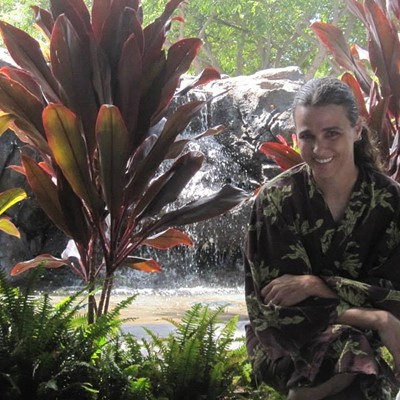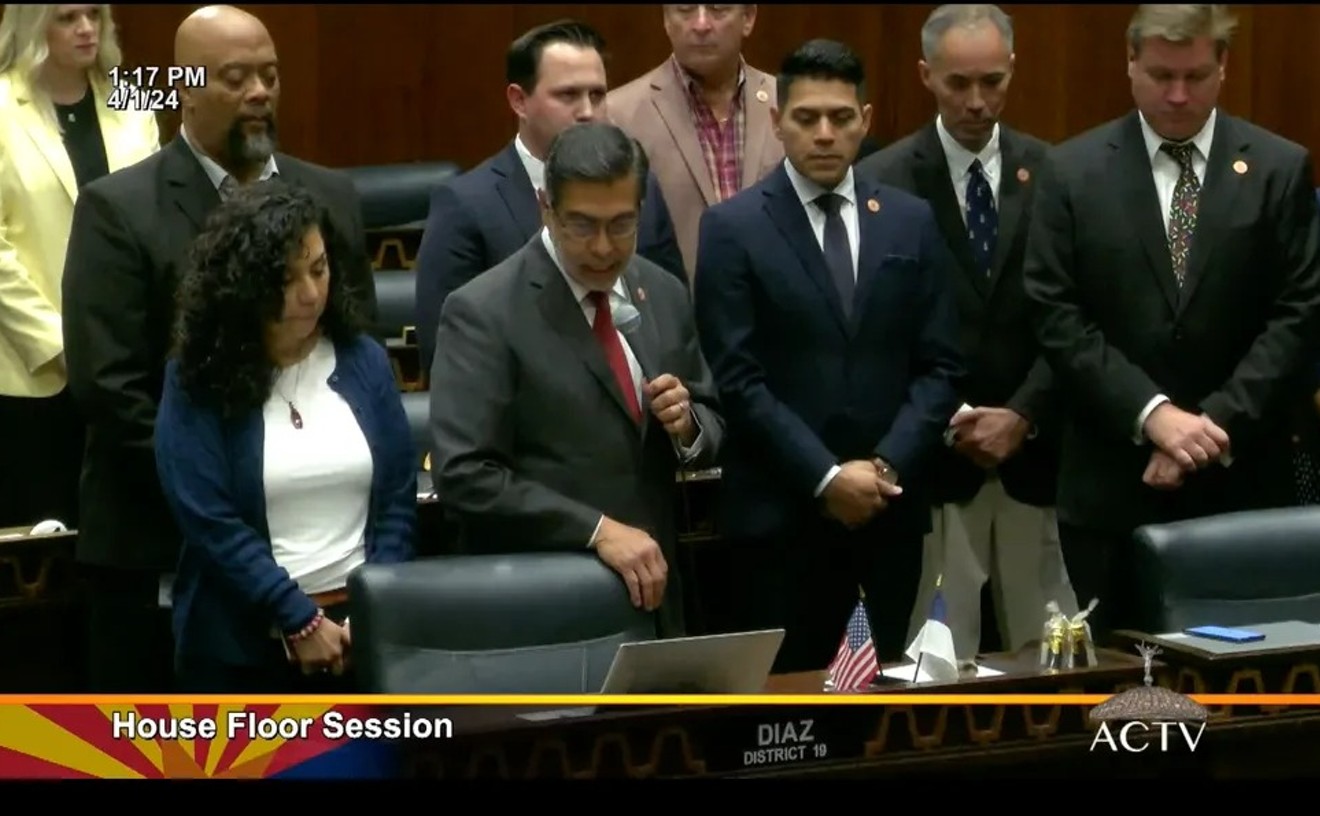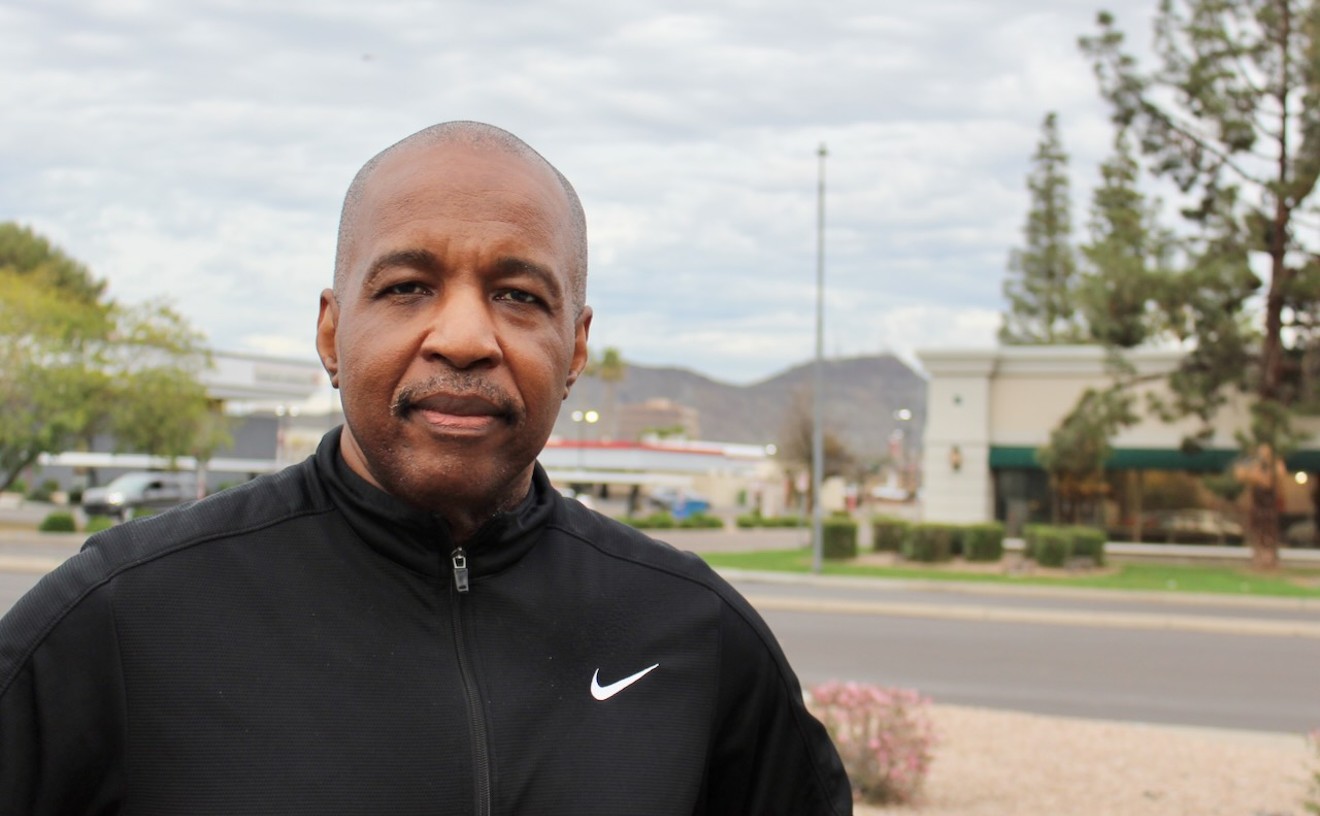On a brisk Sunday morning in mid-January, Wayne Clayton arrives at work at Phoenix Goddess Temple wheeling a brown piece of luggage.
"These are all my healing tools," he says.
Among them are a clear plastic bag stuffed with white latex gloves and a bottle of lubricant. He will use them later in one of his "trauma healing" sessions. But first, he'll receive his own session with a temple "goddess" who calls herself Aphrodite. Clayton says it's common for practitioners at Phoenix Goddess Temple to do sessions for each other. It helps "recharge energy" and maintains an all-important balance.
Practitioners at this self-styled church near 24th Street and Thomas Road say that what they do is sacred work to balance energy and heal people, and Clayton really seems to believe it — at least enough to let New Times watch two of his all-too-revealing sessions.
Clayton's title is "touch healer." He's in his 50s, about 5-foot-8, heavyset, with glasses and salt-and-pepper hair. Aphrodite is one of about 14 women who work at the temple. Like the majority of the goddesses, she appears to be in her late 30s to early 40s. She's tan, blond, and blue-eyed, with faint crow's feet in the corners of her eyes. She says she conducts up to three sessions per day.
Just what is a "session," you ask? Step into the "Persian Room" with Aphrodite and Clayton.
This room is light blue, with accents that include billowy white curtains tacked across the ceiling. Books by Persian poet Rumi adorn the end tables, and sounds drift from a boom box — mostly birds chirping, combined with the sound of a sitar. A stick of Nag Champa incense fills the room with an earthy, spicy smell.
Clayton gets butt-naked and belly-down on a massage table. Aphrodite runs her hands over his back, then takes off her sarong and drapes it over him. She's wearing only a black G-string that reads "I O French ." She tells him she's going to run the sarong across his body a few times, and each time, he should imagine some pain he's had going away. She rubs coconut oil on him while saying things like, "We're all deserving of pleasure."
About 40 minutes into the session, Clayton turns over on his back. He doesn't have an erection. Aphrodite proposes a prostate massage. She puts on a "finger condom" and inserts a finger into his anus, while simultaneously gripping and stroking his penis.
Five minutes of this, and Clayton's whole body starts shaking. He lets out several loud moans, and Aphrodite cleans him up with a wet towel.
After he's dressed, Clayton tries to explain his session from a spiritual perspective.
"The start with the sarong was awakening my skin," he says. "We were developing a relationship, when I started to feel tingling sensations of yin-yang balance. Then she sent meridians up and down my spine to move internal energy better, and we had chakra-to-chakra contact."
Aphrodite's interpretation of what happened sounds less ethereal. She says what New Times witnessed is typically what she does in a session, but regarding the prostate massage, she says, "I don't always do it. Some guys are uncomfortable or they're already erect. Usually, once I rub my breasts on that area, it's over. But if it's a little limp, I'll ask to do the prostate."
"The prostate is a sacred male spot," Clayton adds. "I had stuff there I needed to release."
Phoenix Goddess Temple claims to offer "touch healing" to the sexually wounded and disenfranchised. But really, it appears to be nothing more than a New Age brothel practicing jack psychology techniques.
Licensed psychologists say the "healing" could be damaging, and legal experts say the touching could be illegal. But the temple has been operating mostly trouble-free for almost three years and raking in an estimated $20,000 a month in "donations."
Women at the temple take names like Magdalena, Shakti, and Devima. There's also a high priestess named Gypsy, and a tall, lithe blonde named Leila, who advertises her measurements (36-26-37) on her page at the temple website, which includes photo galleries of each goddess.
The goddesses practice techniques that include genital touching for a "religious offering" of money that generally ranges from $204 to $650. Their advertisements go in the adult sections of local newspapers, including New Times, but Phoenix Goddess Temple founder Tracy Elise says the temple is not a brothel — it's a church, and the services offered are religious rituals to enrich people's lives.
The women at the temple have mostly male clients, while Wayne Clayton (one of the few male practitioners at the temple) works primarily with women, particularly the sexually abused. His form of "healing" work includes spanking and exploring "energy spots" inside vaginas and anuses. He has no license or certification in psychology, but says he offers an alternative approach to solving some of the same problems addressed in sex therapy.
Sex therapy is a relatively new field. Until the 1960s, sexual dysfunctions were generally treated with psychoanalysis. The pioneers of modern sex therapy, William Masters and Virginia Johnson, began doing laboratory observations at Washington University in St. Louis in 1957. They studied things like vaginal lubrication and orgasm, and established the "four stages of sexual response" (excitement, plateau, orgasm, resolution). Their early work advocated therapists as sex surrogates, a technique now shunned in licensed sex therapy.
Subjects commonly addressed in sex therapy include premature ejaculation, erectile dysfunction, sexual trauma, and intimacy issues between couples. Common techniques include cognitive-behavioral therapy, hypnotherapy, and sensual exercise homework for couples. Phoenix Goddess Temple addresses some of the same issues and uses some of the same methods but also incorporates "magnetic energy healing" and "sacred water ceremonies," both of which involve sex acts for monetary donations.
Licensed psychologists interviewed for this story won't definitively say sex therapy works, let alone validate alternative methods. But what they hear is happening at the temple scares them, they say.
"[Sex therapy] works for my patients, but it all depends on people's motivation," says Dr. Marcus Earle, a licensed sex therapist in Scottsdale. "Sometimes, outcomes can be equally effective not doing therapy as doing therapy. There's a chance that going someplace like the temple might be helpful for some people. On the concern side, not having people who are trained to walk people through difficult things in their lives could make things more difficult."
Licensed sex therapists are certified by the American Association of Sexuality Educators, Counselors, and Therapists (AASECT). To be certified, a person must have a master's degree in some area of psychology and a minimum of 50 hours of supervised practice. There are currently about 500 sex therapists in the United States certified through AASECT, including no one at Phoenix Goddess Temple.
But despite treating some of the same issues, nobody at the temple claims to be a "sex therapist." Rather, they are "touch healers" who facilitate spiritual and emotional releases through sexual practices, and accept monetary "donations" for their services.
Whether or not temple practices have any therapeutic benefit, beyond facilitating orgasms, is debatable but highly unlikely. Clients and practitioners claim "energy healing" works, but there have been no empirical studies. "It sounds kind of hokey," says Phoenix psychologist Martin Keller, a diplomate of both the American Board of Professional Psychology and the American Board of Sexology.
"If they're doing sex therapy, sex counseling, or even sex education, they need to be a licensed mental-health provider." He says the alternative "trauma healing" techniques like those described at Phoenix Goddess Temple "sound scary. I see it as dangerous."
And in the eyes of the law, taking money for sex acts — even under the guise of "sacred healing" — is prostitution.
"If these places operate in such a way that I go there and pay money and then a tantric healer touches my genitals, that could be considered prostitution," says James Hays, assistant city attorney for Phoenix. "If I have to pay $60 or whatever to go to a class and, at the end, she rubs my genitals and tells me it's helping my life force or whatever, I've really got to question that."
There's a history of sacred sex temples throughout the world and about a dozen modern versions in the United States. In the past two years, at least three of them have been raided on suspicion of prostitution. Phoenix Goddess Temple was investigated for city code violations, including inadequate parking, in 2009 but has not been charged with prostitution.
Hays worked in adult-business regulations for more than a decade and remembers sting operations on massage parlors in Phoenix in the 1990s, and the prices for services at the time, which ranged from $60 for a handjob to $200 for intercourse. Phoenix Goddess Temple's suggested donations of anywhere from $200 to $650 for their services may seem high in comparison, but Hays has an explanation.
"They're skating on thin ice, so they need to make money to hire a lawyer when the house of cards comes tumbling down."
Phoenix Goddess Temple looks like a New Age resort. The hallways are painted an earthy copper shade and adorned with paintings by Sedona artist Paul LaWrence Curtis depicting scantily clad women playing with fire. Statues and tinkling fountains loom around the corners.
There are two floors and eight rooms called "transformation chambers," each decorated in a different theme, including the "Judeo-Christian room" (all white with paintings of Jesus), the "Egyptian room" (black and gold), and a blue "water chamber" featuring a big bathtub. Every room includes a massage table (which they call an "altar of light"), as well as a bed (called the "grand altar").
There's a euphemism for everything in temple-speak. There are no johns, but "seekers." No sex, only "sacred union." There are no handjobs, only "tantric touch." No payment is accepted, but hefty "donations" are expected. There are no hookers, just "goddesses." They don't work with penises, but "wands of light."
Phoenix Goddess Temple bases its practices on the Hindu concept of chakras, powerful energy centers believed to permeate from points on the physical body. The system as employed in the West names seven chakras, each associated with a color.
There's the Crown Chakra, associated with violet and located on top of the head, as well as the purple Third Eye, located between the eyebrows. There's also the blue Throat Chakra, the green Heart Chakra, the yellow Solar Plexus Chakra, the orange Sacral Chakra, and the first chakra, the red Root Chakra. It covers everything from the waist down, including the genitals.
Temple mother Tracy Elise says their work focuses on the Root Chakra. The idea is that women take energy in through their hearts and men's energy flows out through the Root Chakra. And if a man's root energy is blocked, it creates problems.
"Lately, I'm seeing so many men who actually have no red ray energy. Their red ray magnetic has been off, meaning what's supposed to be a positively charged channel has been neutralized — neutered," Elise says. "They're cut off, because there's so much guilt and shame and fear around the energy of the root."
"There's no science and provability about this [healing system]," she acknowledges. "But it works."
Or at least it's working for them. Phoenix Goddess Temple isn't a registered 501(c)3 nonprofit, although it generates substantial revenue. "Suggested donations" range from $204 for a one-hour introductory session to $600 for a one-hour "Sapphos Duos" session (with two goddesses) to $645 for the three-hour "Sacred Cacao Hot Chocolate Ceremony."
It's been said prostitution is the oldest occupation in the world. Turns out, people have been doing sexual/spiritual work for a long time, too. Historian Herodotus (circa 490 to 425 B.C.) described prostitution at the Temple of Ishtar in Babylon, where the Assyrian goddess of sex was worshiped. The cult of Ishtar eventually spread to Greece, where she was renamed Aphrodite.
The Temple of Aphrodite at Corinth was imagined as a magnificent palace of lusty abandon, where a thousand beautiful women serviced men who came to worship the goddess. But excavations in the 1990s revealed the temple was too small for even a hundred women, and modern historians say the temple women were not high-society beauties but slaves purchased by rich Greeks and donated to the temple as religious offerings.
There's a tradition of "sacred sex" in India, a country known for its ancient sex manual, the Kama Sutra, as well as its temples dedicated to tantra, an esoteric branch of Hinduism that seeks spiritual power and union through rituals that include sex. The Hindu devadasi system — in which a girl was dedicated to a deity's temple — was customary until the 11th century, when invaders from West Asia began destroying temples across India and forcing devadasis into prostitution. India outlawed the devadasi system in 1988.
"In the United States, modern "goddess temples" rooted in female-positive spiritual traditions began popping up around the beginning of the current millennium -- without offering sex. Temples in the U.S. include The Goddess Temple of Orange County and the Chico Goddess Temple in California; the Asheville Goddess Temple in Asheville, North Carolina; the Highland Goddess Temple in Michigan; and the Sedona Temple in Sedona. In 2009, three temples in Seattle -- the Sacred Temple and two Moon Temple locations -- were raided on suspicion of being brothels. All three were run by a woman named Vivian Ellis, who legally changed her name to Rainbow Love. According to Love's Web site, she was "mentored" by Tracy Elise for five years."
Elise, 50, has shoulder-length blond hair and wears a variety of flowing sarongs, some with glittery accents. Between her eyebrows, she wears a jeweled forehead decoration called a bindi. She claims she's had sex with more than a thousand people and had as many as 80 orgasms in one month.
She was once Miss Harvest Queen at the Alaska State Fair. Her transformation to temple mother started in Fairbanks, Alaska, in 1995, when she had what she calls "a kundalini awakening." (Kundalini is a Sanksrit word describing powerful but unconscious energy.)
At the time, she was married with three children and felt stuck. Then she had an enlightening experience with another man. "It actually happened not in a sexual moment, but the first time we held each other," she says. "It was almost like a special effect in a movie — where you see it, and then suddenly it's glass and it shatters to pieces and falls to the floor. It was just like that. I could almost see and sense all of my structures just shattered."
Elise found herself on a new path, one on which she could manifest her inner goddess. "Certainly, I couldn't have become this and stayed married to a very moderate Catholic man," she says. "I prayed the prayer of no return . . . I drove away from my home, my husband, my [catering] business, everything."
Elise landed first in Washington State, where she worked at a massage parlor, then at the Tantra Temple in Seattle for six years.
Seattle has a number of temples, but Phoenix didn't have anything quite like it in 2008, when Elise drove here in her Dodge Caravan with a new mission: bring "sacred sexuality" to the Valley.
Phoenix Goddess Temple began in the spring of 2008, in a Scottsdale residence near 68th Street and Exeter Boulevard. In February 2009, Scottsdale police visited the residence after neighbors complained. Sergeant Mark Clark told media that police couldn't determine whether allegations of prostitution were true, but officials charged the temple with city code violations, including inadequate parking for a home-based church.
Unable to operate under Scottsdale's zoning code, Elise moved the temple to a larger residence near 59th Street and Shea Boulevard. The temple went through two more homes in upscale Phoenix neighborhoods before opening at its current commercial location near 24th Street and Thomas last March. One of Elise's three children, a grown son, also lives in Phoenix and works at the temple.
Six months ago, Wayne Clayton moved from Chicago with his wife to become director of the temple's new learning center, the School of 1 (his wife is the school administrator). He teaches courses such as "Stem Cell Reactivation" and "Spanking as a Healing Modality."
Clayton specializes in "seekers" who have been sexually abused and people suffering from illnesses like cancer, multiple sclerosis, and Parkinson's disease. He's been practicing his techniques — which include role-playing and "yoni release" (yoni is the Sanksrit word for vagina) — for 20 years.
He says he first tried these techniques after surviving years of sexual abuse at the hands of his late father. He tried psychotherapy and says that at one time in his 30s, he was on 37 different medications. None of it worked for him, so he started looking into things like acupuncture, massage, and shamanism. He says they worked for him, and they work for others, too.
But some of Clayton's claims go far beyond therapies, like acupuncture, that are now considered almost mainstream. He says one of his clients in Chicago lost a breast to cancer, and after several healing sessions with him, she grew her breast back. He says another woman in Chicago, this one suffering from cervical cancer and a subsequent hysterectomy, grew her female organs back through energy work. Eventually, she bore children.
"You're a liar and a pervert!"
The naked woman draped across Wayne Clayton's lap screams at him. He's spanking her. It's a sunny Sunday afternoon in January, and they're in the "Red Room" at Phoenix Goddess Temple. This is the role-playing part of one of Clayton's "trauma healing" sessions. He's pretending to be an abusive male figure from her past.
The woman is a 40-year-old "seeker" who says she was sexually abused by her stepfather and grandfather. She wishes to remain anonymous, so we'll call her Jane.
Jane's been having weekly sessions with Clayton for the past three months. Each session lasts two to three hours. The session starts with 10 to 15 minutes of talking before moving to role-playing.
"I'm your father! Have respect!" Clayton yells, smacking Jane's butt. Jane's crying when Clayton strips and they switch roles. Now, she spanks him to let her "anger out."
She smacks Clayton's ass with both hands repeatedly. "I'm 2 years old, and you're rubbing your penis on me!" She screams.
"I'm doing what's best for you," Clayton deadpans.
Jane continues smacking Clayton with tears streaming down her face. "I should have told on you — you ugly, ugly man! I just hope you're burning in Hell! That's all I have to say to you!"
After the role-playing, it takes a while for Jane to calm down. Clayton typically does deep-breathing exercises with her to "isolate energy."
Then he asks Jane whether she's ready to move into the "release" part of the session.
She says she's on her period, but he says that's okay and asks her to lie down and remove her tampon. He gets a latex glove, puts it on his right hand, and grabs his bottle of lubricant with the other. "Can I enter?" he asks.
Jane nods, and Clayton inserts two fingers into her vagina. "Okay, first I'm going to ground your energy," he says. "I'm grounding you to the Earth. I want you to think about the physical release you're going through, and how it will help the emotional release."
He pushes his fingers a little deeper and says, "Now we're going to bridge — feel the sensation? Feel the burning? I'm pushing on your urethra."
Clayton tells Jane he feels her having all these "amazing energy releases," though there's no change in Jane's movements or expression. But twice she does say, "That's too much."
"I'm gonna pull out," Clayton says. "Keep the breathing going. I want you to turn over and we'll do some anal release, get the anger out of there. Then you'll be cooked."Jane says she feels "cooked" already. "We don't want you to leave lopsided," Clayton says, changing gloves.
And so the session ends with Clayton inserting his finger into Jane's anus, holding it there for several minutes and telling her to "feel that energy spot."
After the session, Jane says she feels better. She had a headache when she came in, and now it's gone. Though she hasn't eaten, she isn't hungry. "My body's still vibrating," she says. "I feel energized."
Clayton says he does "yoni work" and "anal release" because those points on the body are important energy channels. He does "cervical work," too. "Every part of your body needs to be touched," he says, "including those inside."
Diane Genco is founder of the AZ Center for Change in Phoenix and a licensed professional counselor who specializes in treating sexual abuse and trauma. She says a licensed therapist would "lose their license in a heartbeat" for touching a patient's genitals, and before a patient can begin to deal with the physical aspects of trauma, a lot of mental and behavioral things need to be addressed. "If these non-traditional healers are not qualified or credentialed in understanding post-traumatic stress disorder and all the things that go with that — the ripple effects of trauma — it could be harmful," Genco says. "If they're just dealing with the sexual aspects of [PTSD], they could do more damage than good."
Genco says part of her practice does involve helping clients "re-learn how to be sexual without trauma being triggered," but "I can't even imagine any kind of therapy that involves touching a victim," she says. "It should never involve directly touching a patient in a sexual way. That is exploitation."
A few days after New Times watched Wayne Clayton's prostate massage, he sent an e-mail stressing Phoenix Goddess Temple is not a massage parlor. "We do not do massage in any form," he wrote. "We don't even use the word massage."
But they do. As of this writing, on the temple's website under "General FAQs," they advertise "prostate massage." And the definition of "massage therapy" under Arizona law is pretty broad. It includes things like hydrotherapy, skin wraps, and the application of essential oils.
James Hays helped rewrite the city massage ordinance in 1989. He says avoiding the word "massage" means nothing. "They're using their narrow definition," he says. "You don't make up your own rules as to what massage is or isn't — the state does."
"Massage" may have a broad legal definition, but "prostitution" does not. According to Arizona law (Title 13), "prostitution" is defined as "engaging in or agreeing or offering to engage in sexual conduct under a fee arrangement with any person for money or any other valuable consideration."
New visitors to Phoenix Goddess Temple sign a form before their first session that states, "I acknowledge I will not receive any type of sexual gratification in exchange for money during my session." But that doesn't mean there's no sex.
"Some of our practitioners do operate with sacred union as part of what they offer, but it's never, ever guaranteed," Tracy Elise says. "You don't want to identify the people who sometimes have sex as people who always have sex, because they don't."
Practitioners at the temple do not receive "payments" but accept "donation only." That could give them some defense, Hays says, "But if it's really a donation, then I should be able to go in there and say, 'I don't feel like giving a donation. Give me the services for free,' and then if there's no services — that's not a donation. It's like a forced gratuity."
But Phoenix Goddess Temple is "really just a business modeled as something they're not, so they can get money," Hays says. "It happens all the time."
Last year, tantra practitioner Janae Thorne-Bird of Heartsong Healing Center in Salt Lake City was jailed on prostitution charges. In 2009, three goddess temples in Seattle — all run by Elise's former student, Rainbow Love — were raided on suspicion of being brothels. Love was charged with three counts of promoting prostitution and attempting to promote prostitution. Love claims authorities violated her civil rights; Thorne-Bird claims freedom of religion — a tricky defense, Hays says.
"The intersection between government regulation and religious expression is very complicated," Hays says. "I can't think of a case here where someone claims to offer sexual favors as part of their spiritual expression. It would be an interesting case, but I don't think it would work well for the church. The sex would be ancillary . . . you can do all your religious things without selling sex acts."
But freedom of religion has trumped the law before, Hays says, pointing out some Native Americans are legally protected in their religious use of peyote, an otherwise illegal substance. And in North Phoenix last spring, a federal judge ordered the city not to enforce its noise ordinance code against a church called Cathedral of Christ the King, which was ringing church bells several times a day. The judge ruled penalizing the church was a violation of their right to religious expression.
Hays says there might be some protections for Phoenix Goddess Temple if they claimed to be a private club, and points out many adult businesses — including theaters, cabarets, and escort services — are legal in Phoenix "if they operate in compliance with the law."
But despite the obvious eyebrow-raisers at the temple, Elise says she's doing nothing wrong. "The temple is really a church for us," she says. "We open ourselves with love as an empty channel, and that's the authority by which I heal. I don't get my credentials on the ground level. I get my calling and I am under the jurisdiction of the most high."











